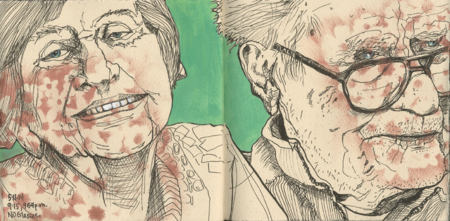
Above: Sketch of Phyl and CR made one evening when I needed to draw something before bed. This sketch was made using photos I’d taken at a holiday party. I wanted to capture Phyl’s smile. It’s a family joke that when you point a camera at Phyl this is the face she shows you. Even now that’s true. Just look through the family albums if you don’t believe me. The only photos I’ve ever seen of Phyl without this smile are the photos I’ve taken of her when she was busy dealing with someone else and didn’t know I was taking a photo. The paper is Gutenberg. I had prepainted it with some stenciling in bronze stamp ink. The pattern unfortunately competes with the sketch, but that’s the luck of the draw the way I prep my pages. The green gouache was added after I’d finished sketching so that I could uncomplicate things a bit more. And I used white on some of Phyl’s teeth because the stenciling fell there and looked odd. Dick likes the sketch of his mom. “That’s her exactly,” he says. He doesn’t like his father’s portrait. It’s exactly like him—trust me. I think Dick still sees his father pictorially as he was drawn by a Honeywell artist at the age of 47. And he might see too much of his own future in his father’s face. (Really they look exactly alike with a slight difference in the finesse of the nose.) Like Dick, CR has those impossible light and bushy eyebrows I’m still struggling, after all these years, to find a visual vocabulary for. But as I said, this looks exactly like him. As for the sketches I make of them when they are in the hospital—I don’t think they ever realize I’m sketching. They’ve never asked to see them. Perhaps they are so used to me sketching that they don’t think I’m sketching them. Phyl is always supportive of my art so even if she didn’t like the sketches I know she would be pleased I was working on my craft. CR likes to be the focus of attention. He also doesn’t ask to see my sketches, but when he has awoken in the hospital and seen me sketching him, he has exhibited an unerring ability to retake the same pose and “slumber” a little longer while I finish; judging that I’m done when he hears me cap my pen.
This is the longest post I have ever written. Blog “rules” dictate that you never venture into this length (7000 words!).
But I had something I wanted to get off my chest, something that has become the center of my life for so long now, that it actually felt disingenuous for me to not write about it so that all my readers really knew what was going on in my life.
Many of you may not care about my life, but only about art instruction. (I totally understand that.) If so, just scroll, and scroll, down, down, down, to the book recommendation at the end. I’ve highlighted it. I also inserted one of my sketches of Phyl there to help you locate the review.
This book recommendation is for anyone with older relatives in his or her life. If you have parents or in-laws still living, even if you don’t read my post, please scroll, and scroll, down, down, down, to the book recommendation at the end. It’s a book everyone needs to read.
If someone you are close to has parents she or he is caring for read this book, just so that you’re a little more knowledgeable about what they are going through.
If you are a brother or sister who has a sibling caring for your parents, read the recommended book—you really do not have a clue if you are not involved in the day-to-day care of your parents what responsibilties, tasks, trials, and joys your sibling is experiencing. My hope is that you will read that book and immediately call your sibling and ask when they want help, and what type of help they need—and then follow through. You can never understand what a full-time job this is, if you haven’t taken it on.
Yes, elder care is the hardest job I’ve ever had, or am likely to have. I’ve worked in a factory sorting computer parts (my reorganization of the workflow for my group to up our productivity resulted in factory wide changes, just because I was a restless 19 year old); as a fry cook (damn I’m good on a flat-top with 20 plus orders going); for a crazy woman whose response to more work was to create taller piles (I got through those piles in 2 weeks and put the entire crew on a new print schedule that kept everyone busy for more than 9 months after I quit); in environments where sexual harassment was the norm (trust me, you don’t ever want to hear my “quiet” voice); and I’ve worked for frantic clients who just can’t make up their mind (so you profile their needs and give them what you know they have to have).
By comparison even with the “difficulties” all those jobs were simple, straightforward, and easy as breathing. None of them prepared me for elder care.
I’ve never had kids. I’ve had people tell me raising kids is the hardest job you can have. Judging from how they aren’t doing a great job of it I think they actually might be right.
Other friends really have had a hard time raising kids. One friend lived to see her adult daughter murdered. Another friend lost a toddler to cancer. Other friends have had to cope with a wide range of childhood illnesses and injuries. Those women had the hardest job I can imagine and I’m in awe with how they managed to constantly live in the now.
But the initial thrust of childrearing is a hopeful business: to bring new life into the world, to carry on, to create family. While that may be short-circuited by a million different experiences, most parents work everyday for the future, the promise of the future.
There is not even a hope of a happy ending in elder care. Someone you care very much for, with whom you have shared great chunks of your life’s history and experience, is failing, deteriorating, right before your eyes.
As Dick’s dad CR says frequently: “Aging is not for sissies.”
That statement used to be somewhat humorous, when he was in his late 60s and early 70s, when he’d had triple by-pass surgery and was trying to put his life together with a physical exercise program and some new dietary constraints (none of which lasted). But at 92, when he says that, you are reminded that he’s only here right now because he is tough and battling all the way.
Sometimes, because we always had a bit of an intellectually adversarial relationship (he likes to argue) it seems that it’s me he’s battling with the most.
I was the person who talked him into moving with his wife Phyllis (Phyl) to an assisted living facility.
Let’s just say I took one for the team.
Dick’s parents love him more than I have ever seen any parents love a child. They love him with a love so unconditional that had he been an insane and cruel person they would still have loved him. I know this because everyone who has come into Phyllis’ circle, from the ex-boyfriends and ex-girlfriends of her children to their children to the children in her neighborhood, are still loved by Phyl despite some of them having really messed up their lives with drugs and crime and just plain stupidity. She doesn’t accept the bad behavior. “Crap is crap,” she is heard to say when someone offers excuses instead of taking responsibility. But she loves the “sinner but not the sin” to use the language of her religious heritage. She’s Lutheran. (That’s one of the reasons you may sometimes hear me call Dick “Lutheran Boy.” Why and when I might do that is a tale for another day.)
So anyway, as I said, I thought the push for moving into assisted living, since it wasn’t going to be welcome, would be better coming from their somewhat bitchy and certainly outspoken daughter-in-law.
I have absolutely no regrets. They were not safe in their home. Phyl slept 20 hours a day. When she did wake up CR heated food we brought over or made a concoction of something that defied understanding (because he’d never cooked anything during their married life and had no skills). But mostly he just gave in to their joint love of sweets and blamed it all on Phyl. So nutritionally they were at risk.
Additionally his sight was failing. His balance had failed.
Since we had over the past 25 years done more and more stuff for the folks, it was becoming incrementally impossible to keep taking care of them in their home. I was spending hours on the road running errands for them. They were weekly firing the cleaning service I had hired to clean their increasingly grime-filmed home.
So yes, I took one for the team and have no regrets.
Just as I have no regrets, when I was first on site at the hospital after CR collapsed in March 2013, over taking possession of his wallet and removing the credit cards and driver’s license, taking his car key and removing his car permanently.
We’d already had to cancel the credit cards twice because of “loss.” And I had been arguing with him for 3 years, unsupported by anyone else in the family, that his vision and reflexes were not sufficient for driving. And he would argue that it was his right. And I would point out that driving is not a right but a privilege, and “What are you going to say to the 3 kids of the 30-year-old woman you kill while driving?” I can be pretty brutal when I argue a point.
I get that giving up the driver’s license was a loss of independence, either perceived or real. But I didn’t see why it had to be. It was the biggest hurdle for me to get over as we went forward—accepting that he saw independence differently, that he believed he had rights that transcended all rational thought and reasonable boundaries, and that I was no longer arguing with someone capable of rational thought.
Dick would visit his father and talk to him about their joint engineering plans and see that his dad could still carry his weight; I would visit and try to show him how to shop for organic groceries (he couldn’t locate the aisles or read the product labels and pronounced it all “too expensive”) or cook rice (he never got the knack of turning off the flame for the last step). In a hundred different ways I daily saw he couldn’t cope with what was needed to get them through the day while Phyl slept.
I watched him strain with his one good eye to read the labels on their large lists of prescriptions. I had to fight with him to give this up. He would spend an entire day filling one week’s pill memory box—without any guarantee the containers had been filled correctly, and 2 days on the phone with drug companies making orders that never arrived in time because he’d forgotten to order. (Dick and I now do 3 weeks of pills in about 10 minutes.) I explained to CR that it wouldn’t take us any time, and that it would free up his time to work on his projects—something only he can do. (I am not above using flattery when it is linked to truth.)
I even took over writing his checks out for him (heck I even find it difficult to locate and read the account numbers on our bills and my eyesight is great in comparison), and then bringing them over to discuss, so he could sign and still feel in control.
Now he thanks me for my efforts with the pills and the bills (though now I write out the checks and Dick, with power of attorney, signs them). CR will never forgive me for taking the driver’s license. He and I both know that. I can live with that.
Once you start doing things for people, like taking them to appointments, involving yourself in their food preparation, and start hiring people to help them not only is there no going back, but you start to see more intimately on how many levels that person just isn’t coping.
They had at least 4 subscriptions to TV Guide. They would get a notice to renew and send it in. Some came from different companies. None will consolidate subscriptions. Now magnify this by over 40 individual magazines—surely someone is looking into this elder abuse scam?!
Once you see how clearly someone isn’t coping you can’t help but look for more ways to make life a bit easier for him or her; or at least healthier.
In March of last year it became evident, because of another health crisis that CR might be able to return to assisted living if all went well, but he would never be able to take care of Phyl who was wheelchair bound and demanded he do everything for her, from helping her in the bathroom (believe me you never want to see a circus of possible peril like that in your life—especially when you have two teetering 90-somethings, the cord from an oxygen tank, and an unstable étagère filled to the brim with toiletries stationed right in the wheelchair’s path) to rearranging the lamps on a twice daily basis, simply because it struck her they should be rearranged.
Because of CR’s hospitalization in 2013 Phyllis was moved to long-term care in Episcopal Homes, and CR was moved to an assisted living apartment that is in the same building, but different wing. They can see each other every day if he walks over. It’s not ideal, but they are both safe and healthy. And Phyl is now up and actively engaged in a range of activities (although still wheel-chair bound) from 7 a.m. to 7 p.m. which is better than CR’s daily activity.
Those moves necessitated the fixing, clearing, and cleaning of their house preparatory to its sale.
Here’s one of the points I want to really get across to all of you who have never dealt with elder care and see it coming up on the horizon. It takes a HUGE, HUGE amount of money to place someone in assisted living or long-term care. The folks are in a great place, with kind compassionate staff. It all comes at a cost.
I knew this was going to be huge. I knew they only had limited savings and their house price to make this happen. I knew we had to sell the house immediately, to stop the flow of money used to keep it running. At least Dick saw this was true.
His sister wrote from California and talked about having an estate sale. I would walk into Dick’s study and stand there exhausted from working all day to clear important papers out of the house and ask, “What does she think your parents still have of value?” The few items they had of value had already been given away to relatives and friends. Phyl has always been a generous person, and in her final years at her house if someone visited they went away with something whether it was a porcelain figure or a Target Halloween ornament. (Dick and I declined all such gifts because we are not sentimental in nature for “family stuff” and we have our own clutter issues to deal with.)
I was so puzzled by this constant insistence on the part of my sister-in-law that we hold an estate sale that I thought, “What am I missing?”
Look, my current looks-like-she’s-still-in-college lifestyle might not seem like I’d know an antique from a replica, but I spent my developmental years around people who collected lovely things and wanted me to understand what made those things lovely, and who were very anxious that I understand the difference between what was real and what was fake and how to tell it at 20 paces. In short, during my childhood and adolescence I was enrolled in an advanced, if impromptu, connoisseur-ship course. In graduate school I was recruited by an art history professor because of my fake detecting skills.
So what was I missing? There were boxes and boxes of seasonal decorations from Target et al. and some wonderful pieces of art made by young artists Phyl has sponsored and encouraged over the years, but there mostly was a lot of well-used and worn stuff deeply unimportant to anyone else.
My sister-in-law kept mentioning the estate sale and even found a woman who could come a couple hours a week and sort so that we could have one in the fall of 2013. I knew we couldn’t wait that long. I finally asked a friend who is an interior designer and antiques collector who has organized many estate sales to come and have a look.
Kathy immediately walked up to a table where there were some crystal glasses with gold rims. “Well, these are worth something,” she began. I stopped her by saying we were sending them to my sister-in-law who entertains.
“Well this vase,” she started. I stopped her again saying it too was being shipped to the sister-in-law.
Less than 30 minutes later, and after several more similar exchanges Kathy looked at me and said, “Look, after you send all that to your sister-in-law there just isn’t anything of value left. A couple pieces of furniture that someone would pay bottom dollar for because he’ll have to reupholster or refinish them, that’s it. You’ll end up owing the estate sale organizer a couple thousand dollars for her time and effort, if you can find someone willing to take it on. And you’ll never find any library who’ll want CR’s books.” (CR had held on to 30 or more years of his engineering journals in the belief that when he needed money he could sell the complete sets to a library—he really didn’t count on digitization and the reduction of holdings now facing all libraries.)
Relieved that I had not totally lost it I made arrangements for someone to haul everything away once I’d gone through each room for photos, financial papers, and the remaining personal items (like clothing).
I cannot say enough good things about Empty The Nest.
The owner Sharon Fischman, is bright, enthusiastic, and energetic. She is concerned about proper disposal and makes it all very simple. The fact that the company then sells still usable items in their thrift shop is another plus—it means they can charge you less but it also means someone else is getting life out of something that otherwise would be in landfill.
Sharon also found the woman who then cleaned the empty house for us. I have never seen anyone work so hard. She cleaned the small rambler for 13 hours. (After 8 hours, I called her every few hours to see if she was ready for me to do the walk through as I didn’t want her stuck at the house waiting for me to drive over.) She cleaned areas that I warned her I thought would require a hazmat suit. Everything shined. There were only some places on the walls she couldn’t “clean” because CR had decided that duct tape, foam tape, and self-adhesive all-weather Velcro, were all great materials for hanging framed photos and documents.
When I did the walk through I actually started to cry. I asked the woman repeatedly if she needed MORE money than her quotation. I am still stunned by the memory.
Here is another of the key points I want to get across to you about the issues related to elder care. It is expensive in time, effort, sanity, and money to clear out and clean a house that has been lived in by one family for 60 years—especially if that family never throws anything away and the mom loves to buy new sheets as a form of “changing” the seasonal look of a room, and has an addiction to fabric napkins and candlesticks.
Find someone in your area who is capable of handling all these aspects of the move. You are still going to put in hours and hours of your time going through the house for personal materials and conferring to ensure that you get all the things your relatives need or want for going forward—I cataloged all CRs books with the help of a friend and then asked him to circle the books he wanted to keep. Once all of those were packed the rest, as Kathy had indicated, had to be pulped. But with the books he really wanted to retain safe, Dick and I were able to purchase and install shelving in his apartment so that those books are accessible for those days when he feels up to working. I think that’s the kind of independence you can best support.
The good news in this story is that because we acted quickly and got the house on the market just before an interest rate increase, and during May when the lilacs in the backyard were blooming showing everything to best effect, the folks got a phenomenal price for their home—a price that made their current living situation possible.
(We also had an excellent realtor—Susan Jacobsen of River Arts Realty. I now refer to her as “my” realtor and know that I will never want anyone else to help me sell or buy a house. If you live in Minneapolis and need a realtor you need to call Susan.)
What I’d like you to take away from this portion of today’s story is that you need to COORDINATE. Things have to be emptied, and furniture has to be moved and the house has to go on the market. Each thing has to happen before the next can happen.
If we had waited until last fall to sell the folk’s house it would probably still be on the market and there would be severe financial issues stressing us more than we are already stressed.
So find people to help you BEFORE you believe you need them. You’ll know that you’ve found a solid agent of change to help you if that person sits down and clearly explains a timeline for her part of the picture and helps you understand the overall process.
It has been over a year now since the folks moved into Episcopal Homes—Phyl in long-term care, CR in an assisted living apartment. There have been more hospital visits for CR, some planned, some unplanned. Phyl continues to thrive. Once she understood she could continue to live there she started making friends and involving herself in activities. In short she did what she has always done throughout her life—she dealt with exactly what was facing her, without nonsense or shying back from reality. She is in many ways much stronger than her husband, despite her wheelchair.
While she may have memory issues (on some days she can’t remember her second son is dead, on other days she doesn’t remember the circumstances of his death) she is aware of her brain’s changing functionality.
Every time I see her she asks me, “Are you still living with Dick?” (Since I’ve visited almost every other day since April 2013 until I was ill this year and couldn’t go out, she has asked that question hundreds of times.)
She asks because decades ago Dick and I went through a really rough patch and I went to talk to both her and CR, to explain that I might be leaving the family.
Somewhere in the databanks of her mind she’s not sure that all that was resolved. And she’ll say what she said that day, decades ago, “Tell him to shape up. He needs a good kick in the ass, he’s a good guy, but he can be a pain in the butt.”
I think of this as just one more way her ability to give unconditional love to everyone manifests in the world, that she can take “my side” against her much loved son, even if there are no sides to take.
Often she’ll ask things that seem to come out of memory loss, but which when you talk to her daily or even only a few times a week, you realize represent her way of checking reality.
She has told me on several occasions that she knows her brain is going (“but I’m still more with it than anyone else here”—and you have to believe it). When she asks questions she’s looking for confirmation that what’s in her memory is real, and not a dream or a dementia-grown implant.
Recently the family lost a young cousin to a horribly tragic death. Dick and I explained all the circumstances to Phyl. She is one who can face facts. She is one who wants details. She was deeply saddened by the loss. Her thoughts were all on the mother. But the next day when I visited she asked where Dick was. I told her he had gone to Tim’s funeral at Squaw Valley. Immediately it was evident she had no recollection of recent events and we relived the whole horror again. The request for details, the mulling over what could be done. The deep sadness for his mother (one of Phyl’s favorites). For several days after that things were fine and the topic didn’t come up. Then upon Dick’s return with family photos Phyl needed it all explained to her again, as if it were a new event. Knowing and then not knowing. Fresh, and then forgotten. The intensity with which she feels the emotional pain is balanced with the inability to hold the hurt. There is some comfort in that.
CR on the other hand has battled his diminishing mental capabilities with his stubbornness and a failure to accept that what he knows from his brain is not real. He’s always lived by his brain so he refuses to doubt it now. He has lost many a dime (his self-determined limit) betting against me on what I know are sure things. I tell him I don’t want to take his money, but he keeps insisting on what he “knows.” For instance before an old family friend came to visit this summer he claimed she wouldn’t be coming because she and Phyl had fought. I explained that I’d just received an email from the friend with travel plans so he was mistaken. “Besides, what do they have to fight about?”
Sometimes when I ask him a follow up question like that I see him catch himself, and search in his brain, and consider for a moment how unlikely his statement really was, all before reasserting the same illogical statement.
There are several factors at work here—his hearing is bad. Sometimes he hears part of what you say, and then part of something else and patches them together. The result is a little bit as if someone went to a stand-up routine and heard the set up of one joke, went to get a drink, and came back to hear the punchline of another joke.
He doesn’t see it like that. He sees it as “TRUTH” from his brain.
Like I wrote, I’m racking up the dimes!
Another factor is that where once there was a clear boundary between dreams and real life, between dreams and the memories generated by real life, now there is only a slight membrane through which everything flows unimpeded.
This is the part of elder care that is hard, really, really hard for me; harder than the physical debilitation.
I have long ago accepted that arguing with CR about all the things we used to argue about is meaningless. I have stopped jumping at the bait when he tells me that he doesn’t like his eye doctor because the doctor isn’t helping him deal with his legally blind eye (there is no help for his condition; I love his eye doctor and used to defend him, now I just say, “hey, let’s ask when we visit next,” or “Talk with Dick and he’ll explain it,” because he still does value his son’s wisdom on all things medical).
(My friend Pat has helped me work up a strategy for easier communications with CR. It took someone who knew me and my mind but who wasn’t involved in the exchange to do that; just as my friend Diane has gone ahead on her journey with her parents and reached back to help me along—you are really going to need the help of your friends, if only to just speak with someone “who gets it.”)
Trying to talk “sense” to CR, or to make points in an argument with him is like shooting fish in a barrel, and he’s the fish, with no fighting chance. I’ve never been a bully. I may be the evil bitch who took away his driver’s license, but I am not a bully.
Dealing with the failing minds, for someone like me who has always feared just that—losing my mind—is hard. It’s bad. Actually it’s hell. Because now, sleep deprived from worry over getting their appointments in and making sure they have this and that, and 10,000 other things that we do for them, I find that I don’t remember what I used to remember. I might be talking about a film and instead of being able to tell you the year it was made as well as the main actors, director, screenwriter, editor, and casting agent (don’t ask me why, I used to keep track of casting agents and their careers) I’m lucky if I can start a sentence with, “That guy who was also in, you know that other film about WWII with oh, the blonde guy…” Then I just give up. I suppose that really is what the iPhone is for, but I’ll be damned if I’m going to whip it out at lunch and look something up.
I’ve forgotten more about Shakespeare and Dickens than I ever thought I would. I see glimmers sometimes. And I see the now vacant passageways where that knowledge once lived. It has left, leaving a memory scent behind, telling me only that I’m looking in the right “rooms.” In other words I still know that I used to know a lot of things, and I know what those things I knew a lot about were, but in many instances I really no longer can call up the actual facts I used to know.
Hell.
So why am I writing at length about all this now, especially since I admitted early on we’ve been taking care of Dick’s folks for the past 25 years, letting that care set the tempo to our lives, keeping us here, available for that care.
I’m writing about it now because in the past 2 years we have crossed several critical phases. In many ways elder care defines my life now (not just why Dick and I haven’t vacationed together for more than a night away in over 25 years). I wanted to share that reality (it’s why I’m not traveling as much to teach; why I’ve scaled back on my volunteer activities; and why I’m painting fewer paintings).
I see and meet many people every week who haven’t got a clue about elder care and the shit storm that is about to hit their lives. I thought that by writing about my experience some of the particulars might jar people into preparing. In many ways my hands were tied. I am not their child. No matter how many times I tell the nursing staff at the residence that I’m not Phyl’s daughter they don’t believe me because they see me all the time—in fact I am so familiar to the residents I have been asked repeatedly to call bingo for them. But the reality is as a non-child I have all the duties and expectations put upon children without any of the rights to go forward with action that a child does.
I want to urge you to have early talks with your elders (and your siblings if you have them). Get them to make wills, get them to make living wills, get them to sign treatment expectations forms like DNR (Do not resuscitate) forms if they want to be proactive in their care. They’ll need everything explained. And after a certain age explaining until you turn blue won’t help at all. Only you will know when that time will come.
Also you need to start spending daily time with your elders to get a realistic picture of how they are living and coping alone at home. Relatives come into town for a few days or a week, do things with the folks and leave, thinking all is well, “they’re not doing that badly.” Dick and I then spend the next month helping them recover from the exertions of dealing with visitors. (When they were at home this meant both of them took to their bed for 18 or more hours a day for weeks at a time.)
My only regret in this whole process is that I didn’t push Dick harder about things like the driver’s license (we were just lucky on that one folks) and the realities of maintaining life in their house and their options. You need to talk to your elders way before any of that is needed. You need to make plans, get on waiting lists, get sorted.
Your elders at 60 or 70 years of age might seem young and vital, not frail at all. It’s still not too early. Plan ahead. One slight misstep can set in motion a cascade of health incidents that will have you scrambling.
Sometimes it takes someone like a “not-a-daughter” to see that the time has come and make everyone else understand it.
But if you’re that “not-a-child” who’s involved my sympathies are with you because it will cause more stress than you can imagine to your life and to your partnership. Be prepared.
And if you are aging, I urge you to act preemptively and get yourself in order—clear out your house, put your important papers in order—I spent three 8 hour days searching every folder in the folk’s house looking for necessary tax papers. I went from file cabinet to desk drawer to file cabinet to cupboard in another room, following a trail of folders labeled, “Important Tax Papers, Phyl and CR” only to find each one EMPTY, while the master folder into which their contents had all been combined remained elusive.
That’s just one example.
We’re all going to die. It’s best to have things in order so your death doesn’t become a major league headache in the life of someone who loves you.
Maybe I see this all so clear cut because I have never worried about dying. In fact when I was young I doubted I’d live past 35 for some reason I’ve never been able to pin down, unless it was the massive hours spent flying and living where plagues, disease, and parasites clustered down the street from us.
I still don’t worry about dying. I do on the other hand worry about Dick dying before he finishes organizing all the folk’s papers!
Here’s the advantage to having those serious talks before it’s too late. Everyone gets to be on the same page and work towards the same goals and results. Some people may even be able to opt out. To make it clear that they are opting out so that everyone else knows how much slack they’ll have to take up.
When things were going badly with the folks declining at home and CR was still driving, I actually tried to opt out of it all. I had too many ethical and moral objections that reached the core of my body to be even a standby participant while he still drove. But in my case the reality was I couldn’t opt out because then it all fell on Dick; so the opting out thing doesn’t really apply to most people and you’ll lose your sanity if you think it does—so just start talking and planning about it NOW.
The other advantage to working through all this stuff early is that you get to the fun bit sooner.
Fun bit?
Yep. Elder care is fun, just like all those other supposedly hard jobs that I have had in my life that turned out to be easy.
It’s fun because now that they are safe, and eating well, and there are extra people besides just Dick and me checking on them to see “if they are still breathing.” And it’s really fun to be with them.
Well, it is really fun to be with Phyl because that unconditional love just coats you, and because she is philosophical about the brain decay, and she has, as always, embraced gratitude. She has that down pat.
It’s fun to be with Phyl because she doesn’t have an agenda. She is just being in the now. I know that there will come a time when she won’t even remember who I am, but I know that I’ve already glimpsed that time and I’m OK with it because we’ve had so much good time together. All because she taught me about unconditional love.
(Though I’m quick to remind Dick that if he wants unconditional love he should go to Phyl—I’m not made that way.)
My relationship with CR is still very much a work in progress. We have certain conversational topics that are “no-fly zones” in our relationship. The list grows every day. Since he no longer has the memory to remember what’s on that list, I have had to let go and find a way to not care about the nonsense or even wrong-thinking way he argues. It has made me find havens of thought we can talk within. This has engaged my creativity and my heart.
The other fun bit of elder care is the memories—of course theirs are failing so sometimes I have to be the one to remind them of something. But it’s good to hear the stories, and to help them remember the stories that mattered to them.
And there are wonderful little moments in elder care that happen even in the direst circumstances (like the hospital) that make you happy you can be present for someone else, present to witness his life even as he is getting ready to leave it.
Growing up I had no role models to help me deal with how to care for others in old age. My family lived overseas away from my parents’ parents. I went for years without seeing another relative. When we did live in the U.S. we perhaps saw our relatives on major holidays, but typically not more than once a year. It wasn’t until I came up to Minneapolis to attend graduate school that I had any time with my paternal grandmother on my own. We were able to form a relationship based on where we both were in life, at that time, without any of the quibbles, complaints, or fondnesses others might have tried to cast upon us.
In Dick’s family I saw intergenerational relationships. We lived above his maternal grandparents for years, helping them with lawn care and grocery shopping, seeing them everyday. That’s the type of guy Dick is, and the type of family his mother ran.
So those are my experiences and recommendations. Take action now while minds and bodies still function.
Get on to the fun bits as soon as you can.
The fun bits make the more difficult bits bearable. We are after all working towards the inevitable.
This has been a somewhat sanitized recounting. I haven’t written about the details of physical decline. Such decline is normal and to be expected. I am less squeamish about deterioration of the body than of the mind. Helping someone clean up after an unfortunate toilet experience is something I can cope with—I had that experience with dogs whom I loved; I can and have provided the same care for aging adults whom I love much more—as long as my own physical capabilities allow it and don’t put them in jeopardy. You always need to be aware of when you yourself need help.
I haven’t written about all the frustrating conversations I have with Dick when he doesn’t act as quickly as I need him to act. We have to constantly negotiate a path to move forward on. We have to balance my need to plan with his need to let things go. My need to see what is and his need to see what he remembers. Since either reality can exist in a given day it is not a comfortable dynamic.
I haven’t written about times when frustrated, one of them bursts out in irrational anger. There’s much to be frustrated about in their lives with the growing limitations. Caring about someone makes it easy to not worry about these outbursts, but they take their toll in added stress. I have friends for whom such events are their whole experience of their parents’ aging and they continue on with compassion.
I know everyone’s experience is going to be different. I just wanted to take time today to give you a heads up.
It’s never too early to think about all this.
Tips For Easier Elder Care (Obvious, but they have to be mentioned…)
Find a secure way to always carry the following information or items (I keep some stuff on my iPhone like a prescription list but I also carry a hardcopy to leave with the doctor):
• a complete prescription list that includes dosage and reason for the prescription; also include any drug allergies and their pharmacy name, location, and phone number (so that doctor’s staff can call in prescriptions)
• a medical history listing all operations, drug allergies, and any implanted medical devices (such as heart valves)
• consolidate all their insurance information and have it on hand, along with any account cards
• social security number and date of birth (if not memorized)
• doctors’ names, addresses, phone numbers
• any passwords or number codes they may use (in their home alarms or on the computer)
• their address and phone number (since these were new in our case I haven’t memorized them and you need them every time you go to an appointment)
• apply for a handicap parking sticker (in Minnesota these can be hung on your rearview mirror when in use)
• apply for a photo id card before the expiration date on his or her driver’s license. You need a photo id in Minnesota for doctor’s appointments.
• a laundry marking pen to label clothing; check clothing frequently to relabel as needed
Pitfalls to watch out for:
Avoid scheduling multiple appointments in one day. Transit times are always longer with slower moving elderly. And if you are wrangling 2 elderly individuals be alert to the time when both need so much attention (with wheelchairs, or to keep from wandering off) that it’s no longer possible to manage both at once. In our case it made CR upset he couldn’t go to all Phyl’s appointments (because I couldn’t help him too, and make sure he didn’t wander off and get lost), but I give him a report when we return. He realizes that’s better than the risk of injury to himself.
Be mindful of their assisted living eating schedule. In our case they really locked into the social aspects of dining and don’t like to be out around meal times.
Don’t neglect your own health. Learn from my bad example. I lapsed from my on-going physical therapy regimen (to protect my neck and back) while clearing their house, moving them, taking them to the doctors (lifting the wheelchair etc.) and injuried my dominant arm. Find a massage therapist for you and for them!
Set up their computers so that you are the administrator and they are a user—this prevents them from downloading random software from the internet which may gum up the works and necessitate re-install of the system. (Believe me, they won’t remember what they installed or clicked on.)
If your elderly loved ones still like to use checks or a debit card, create a new account with a limited amount of cash in it so that if they lose the checks or card it’s less of a headache.
Talk to a memory specialist for strategies on how to speak to or deal with the particular situation you’re faced with. They’ve done this before and have great advice which will remove stress from family interactions.
Buy 2 or 3 padded folding chairs to keep in the closet to bring out for times when there are multiple guests (sitting is always limited and you really want to be able to put away the “clutter” they might bump into).
Visit during the day to see them at their best; people slow down in the evening and you might not get an “accurate” view of their current level of engagement.
Familiarize yourself with do-not-ressucitate definitions and discuss them with family members to undertand the realities and the wishes of the elderly.
3M Command Strips are your friend. Have strips as well as strips with a variety of hooks, always on hand for hanging framed photos in apartments and nursing home rooms. (Target is a great source for inexpensive frames.)
NOTE: PeggySu wrote to me privately asking that I remind people that POAs (power of attorney) are only good during the person’s life time. I thought that was clear in reference to how Dick was able to pay their bills now in their lifetimes, but in case it isn’t I’m adding this note. She recommends, since she has actually gone through the whole process past the deaths of her parents, that you hire a lawyer to help you deal with the legal requirements that fall to the executor (such as putting a notice to creditors in the newspaper by a certain date). She’s found the help worth the cost. And I think that’s another bit of helpful advice to add to your list. I assumed that as you started to get some of the documents in order you would seek legal help of some sort even if you were a lawyer (because everyone specializes). I am encouraging you to do that as soon as you can because there are so many issues involved that have legal and financial ramifications. This post wasn’t meant to be a comprehensive guide, but just to highlight the things that are immediately going to hit you. It’s worth it to pay a lawyer to help you set up a plan, just as it’s worth paying the other professionals I’ve mentioned in my post for clearing, cleaning, realty, etc. You’ll have enough to cope with beyond trying to get up to speed on everything else that’s flying at you. Happily the one things the folks had organized years ago was their after death stuff and it has been constantly updated.
Above: A sketch I’ve shared with you before in a post on Sketching in the Dark. I’ve placed it here to encourage you to sketch your older relatives when you find yourself bedside. (They like waking up to find you there.) And also so that you could more easily find the recommended book at the end of this very long post. If you’d like to see recent sketches of CR in the hospital here’s another link. Click on the image to view and enlargement.
RECOMMENDED READING
And if you don’t believe me, I’d like to recommend you read, Roz Chast’s visual memoir, “Can’t We Talk About Something More Pleasant.” (The link is to an Amazon listing, but I’m not affiliated with Amazon. Buy the book from your local independent shop if possible.)
I originally read a section of this book a couple months ago in an issue of the New Yorker Magazine where Chast’s cartoons are a frequent fixture. I pulled the pages out and put them in my journal. They were so well observed, so full of truth, heart, and humor.
Recently a friend told me there was a WHOLE book by Chast about the experience of coping with her parents’ aging and death.
I bought the book and read it in one sitting. I’ve told friends to read it. I’ve given copies to other friends.
Her experience is not one-for-one a mirror of mine. She was dealing with her parents with whom she had a lifetime of memories and shared experiences. I’m dealing with my in-laws. I came rather late to their party, though they then became the main feature at the party that is my life.
Despite the varied differences I found it reassuring to read Chast’s book. To hear someone express doubts or frustrations about similar or related experiences to those you are experiencing when under extreme stress to get it RIGHT when you only have one go at it, is reassuring and life affirming.
In 2000 my friend Roberta Avidor sketched at her mother’s deathbed—incredibly beautiful work. It struck me then that there could be no better use of one’s time in such a situation. Because of that I have in the intervening years amassed quite a collection of sketches of the folks in the hospital while I spend time with them. It keeps me present, it keeps me from stressing, it keeps me open to what is happening to them, and it passes the time calmly while waiting for the endless round of doctors. It was good for me to see that Chast took up that practice in the final year of her mother’s life. (In those drawings she steps outside of her illustration style we are so familiar with.) It’s just one more bit of encouragement that her very brave book provides.
Chast helped navigate with her folks to their deaths, and she’s left a trail of experiences that she has been able to digest and present for us that speak to us even when our experience isn’t quite the same. It’s an invaluable book. I hope that everyone reads it. If you never have to deal with elder care it will give you insight into the lives of those around you who do, who may be dealing with elder care right this minute. The book will help you understand why your friends’ stress levels are high or why they seem to have no energy for or enjoyment in your usual shared pastimes. The book will help you understand their situation. And if you are one of the millions and millions who are facing elder care responsibilities I know Chast’s book will help you prepare, with an open heart, for the inevitable.

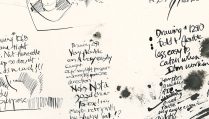

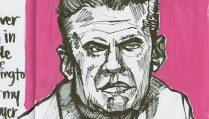



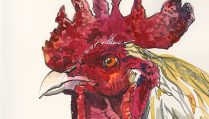











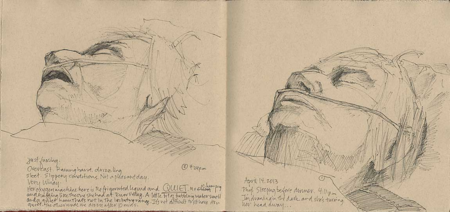
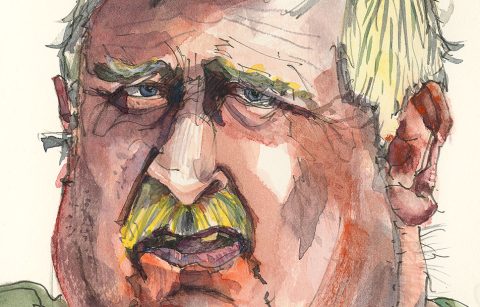
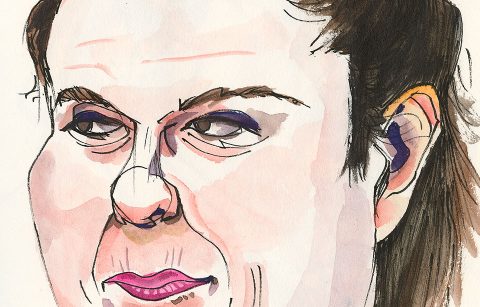
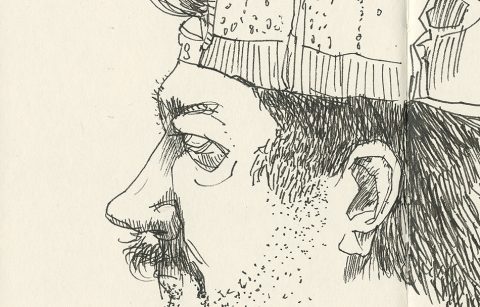
Roz, I always admire those who take on care for the elders. And you seem to have such a rich experience in it. The advice you gave is invaluable. You’re right that they are seemingly obvious, but sometimes people can be shortsighted when they’re in a stressful situation and it helps to give them reminders and perspective. (I find that the one about taking care of yourself is sadly the most neglected.)
Elderly care is both a challenge and a joy. My first assignment back at the hospital was at a stepdown ICU of sorts, where we had all sorts of long-term elderly patients, mostly post-stroke with some sort of difficulty with motor functioning. We the nurses would teach the family or caregivers how to assist their loved one with the more complicated procedures until they could do it all by themselves. (Ultimately, though, we learned plenty from them as well.) And I’ve always felt that we in the health care field (in my country, at least) didn’t prepare them well enough. No matter how hard we stuck to the SOPs, it always felt that there was more we could have said or done even after they were discharged. My kudos, however, to the good majority who did it wonderfully anyway.
Keep up the great work, Roz. Phyl sounds like a sweetheart!
I think this is such an honest and important account. I think you should actually publish it because it has such personal truths which resonate with anyone who has been in this situation. I haven’t read the book you recommend yet but your account is incredibly valuable. Thank you. It’s just so hard and people who haven’t done it have no idea, especially family.
Thanks Phillippa, I am glad you found this helpful. I hope you get a chance to read Roz Chast’s book. It sounds from your comment that you’ve been dealing with eldercare and I think her book would help.
You’re right. This is a life-changing experience. That you can even organize your thoughts so well while still very much in the middle of this process speaks to your strength. It’s been 14 years and your words brought it all back. Hang in there. Take care of yourself and your marriage. And thanks…..someone who needs this will read and take steps in their own process.
Thank you Roz. It is stunning to me how your account is both so straightforward and so elegant. I am experiencing so much of this right now with my mom. My brother has “opted out” as you say. Taking away the drivers license was horrendous. Moving her to a memory care assisted living facility very difficult for everyone but the best thing we could have done. Cleaning out the house was worse, so much stuff. Table cloths, place mats, linens, towels, seasonal decorations, glassware, dishes, and all the crafts she made: cross stitch, needle work, quilting, ceramics, the list goes on and on. So painful getting rid of all the things that represent her life. We also declined taking much of it as we are also not very sentimental about family stuff and I kicked the clutter habit when we built our new house three years ago but the temptation to begin amassing stuff again always needs to be kept in check. I did take a couple of boxes of stuff which I have packed away in storage. The irrational thought processes, the blurring of reality and not reality, her fears, and anxieties, always bad but exponentially worse now….watching her decline mentally is excruciatingly stressful and painful I have the added disadvantage of also being unable to deal well with the physical dysfunctions too. And yes, the amount of time it all takes, the stress it puts on me, my husband (God knows I would not have been able to deal with this without him!)is sometimes unbearable. Add to this situation that our 21 year old autistic son lives with us, and we love him unconditionally, but he has a host of OCD, anxiety and behavior issues and yeah my husband and I haven’t been away for a vacation together alone since 1989 and as a family since 1998. I don’t feel so bad now that yesterday I told my therapist that I was thinking of taking a year off from painting, exhibiting and entering juried show to concentrate on my sketchbook journaling because that’s what was nourishing me most right now. I wish we had been able to prepare for all of this ahead of time, but even if I had wanted to my mom is a serious lover of denial and would never had admitted that she would ever need any of that pre-planning. We managed to squeak out POA and living will just before her cognitive functions would have made that more difficult to acquire. So I’m rambling and for this introvert to share this much is astounding. Just one more way these kinds of situations change you I guess. So any way Thanks for sharing Roz, it’s just what I needed to read today. Hugs.
Thank you so much for sharing this.
Yep it’s hard work, I’m at 4 years of being a carer for my mother after a stroke. Scotland has free care for the elderly, but not the accommodation and feeding thereof. So to keep my mother in her home I have the healthcare provided to the home. And I now share her home, as principal carer they can’t throw me out, but they can put as lean on the property should she go into care. They charge just a little more than an outside ensuite cabin on the Queen Mary for local care; and I think the food on the Queen Mary might be a tad better. A lot of my friends are in similar situations. To save what is also my home now, I’m in the middle of declaring it a farm, producing rare plants and quails eggs as that’s exempt from the lean. As for getting hoists and wheelchairs and a hospital bed, it’s been an eyeopener. Visiting carers who won’t give her her glasses as they are “only there for a toilet break” Personal favourites include “This door is in the way of the bed” Reply “Well shut the door” Or “We have to stand in front of your mother on the commode as it has no brakes fitted” The fact that the commode has no wheels and can’t move didn’t seem to go down too well. I better stop; but well done Roz on being very focused it’s less than not easy.
Thank you, Roz. You’re a treasure to your in-laws and your husband, and to yourself and all of us who read your blog. Bless you.
The personality of the elder is so key in this whole process. Do they deny and deflect every movement toward change (when all can see how necessary it is) or are they at all open to assisting in the massive task? I’ve dealt with both, and sometimes the inevitable disaster happens and all you can do is pick up the pieces.
For myself, I have itemized and cleared much, and keep our “Financial Summary” file up to date for all our important accounts so that my child (or the remaining spouse) never has to figure out the mess left behind.
And if you have the funds, a safe, caring retirement facility can be a wonderful place to ease oneself out of this life.
I can’t thank you enough for taking the time to write this in so much detail. In addition to your very helpful advice, your examples provide a reality check when one has to cope with simplistic advice from others who’ve apparently not had these experiences with their elders. I’m glad you added the part about “friends for whom [bursts of anger] are their whole experience of their parents’ aging.” [This could also be true of their earlier lives]. It always amazes me how many people seem to have had elders who were always sensible and kind and a joy to be with. One of my sisters was the primary caregiver for both my parents and I know that no matter how hard I’ve tried, I’ll really never know what all she dealt with. (Luckily thanks to seatbelts and airbags no one was hurt in the accident that made my father realize it was time to stop driving.) I too loved Chast’s memoir that was in the New Yorker; thanks for pointing out that it is part of a longer book.
I’m glad you emphasized the difficulties of the “not-a-child” situation which I experienced in a slightly different form that I’ll describe for the possible benefit of others. By coincidence I was the new wife just at the time my new mother-in-law, who was a long-time widow then around 75, was showing the first signs of dementia. (My new husband’s divorce had occurred a number of years before I had even had met him so that wasn’t a factor per se.) You are right that the children (in this case three siblings) are less likely to see that the “time has come” than we “nots” are. For too many years I had to deal with the explanation that “she’s just acting like that because she doesn’t like you; she really loved the first wife.”
The previous comment about Finances is a valuable reminder. Having recently become an executor I’ve learned the importance of thoroughly understanding financial options. For example, TOD (Transfer On Death) accounts have made my job a lot easier.
Thanks Chris, I appreciate your note.
Janblencowe, I am sorry your brother is opting out. I know how hard all the things you’re listing are but in all of them there are small victories we can enjoy with humor—like how you’ve kicked the clutter habit! I’m glad you have a strong and helpful husband. All of this on top of helping your autistic son—it is clear to me how you must feel relief taking time off from the exhibition schedule! I hope the year of sketching in your journal brings you all that you’re looking for.
We can’t really plan ahead for any of this, since there are so many variables, but I hoped that by writing about it I would give people a heads up—some items can be planned for—like finding helpers for certain tasks like clearing a house. It’s never too early to start asking friends for recommendations for those types of businesses.
Thank you for writing in and sharing your experience. It helps me!
Thanks Kate.
AAAARGH~ Just wrote a huge long post and the anti-spam/sign in stuff ate it. First and foremost: know you are not alone! So many of us have been there, done that. Out here at the other end of the ether, from SkBkSkool-landia, we are sending hugs, light, and support.
My mom cared for my dad, who was 20 years older than she, until just a few weeks before he died; I lived 3000+ miles away, so the burden fell on her alone (no siblings or other family near them). As a result, she did do some things right: had a power of attorney with me (only child) named, etc. But she was suspicious of everyone, at one point tried to revoke the POA but luckily the attorney realized mom’s dementia was getting so bad so quickly that she was on the verge of not being able to accept instructions from mom because she was no longer mentally capable.
We moved, well, *I* moved mom from California to Maine to assisted living. It was brutal. We moved EVERYTHING because she didn’t want to sell anything, and it was imperative to get her moved within a matter of weeks because the decline was so rapid she might not have ben ABLE to make the move if I took the time to sell off stuff there.
At the same time, our old son was in a teenage downward spiral, engaging in dangerous behaviors, etc. Since he and hubby/dad did not get along, that burden also fell on my alone. That meant our younger son didn’t get enough attention from me, nor did hubby. Which led to further stress as our relationship went from difficult to worse. I don’t know how I made it. At one point my husband said tell me when it gets beyond the point of bearing and I looked at him and said I passed that stage so long ago I can’t even remember it.
While under stress, your own memory and recall are garbage. I bought a composition notebook and wrote down EVERYTHING. Saved me many a time. After 3 years, mom died, and 11 days later the teenager moved out and started getting better.
Unlike your relatives, mom wasn’t very nice the first two years in Maine. She was difficult and unpleasant. She was probably afraid because she knew things weren’t right in her mind, but refused to accept it. By the last year, she couldn’t complete a sentence–she’d get lost after a couple words. Like a toddler, she could say she hurt, but not what or where or how. The Asst Living staff couldn’t give her pain meds unless she asked, but she didn’t know HOW to ask or even articulate that she hurt. She also was angry at her family for not calling her–she didn’t realize they had been dead anywhere from 10 to 40 years. So I learned to tell her they were all fine, as good as they had been in years–all true! And that she’d see them soon enough (which if there is indeed an afterlife, is what she’s doing now).
During those 3 years, my career–which had been on an upswing–stalled as I didn’t have time to make art, travel teach or write. Work faded, and I felt like I was going to expire. Once mom died, I could sell stuff off, close out accounts. I knew I was beyond stressed, and Iknew it would take time. In fact, it took nearly a year to begin feeling human again.
Give yourself permission to be stressed, angry, sad, happy. Give yourself a chance, every four or six months, to play hooky. Instead of doing the chores and errands and whatever, take a day just for you. If that means staring at a wall, taking a bubble bath, not getting out of your bathrobe until 9 pm when you take a shower and put on fresh jammies to go back to bed, so be it! Eat a pint of Ben and Jerry’s in one sitting. Read. Push paint on a page, just give yourself permission to take a time-out for your own sanity.
And to end this LONG post, I’ll go back to the beginning. You are NOT ALONE. Vent. Cry. Paint. Share. Ask for help if you need it–and you will. Even if I only know you from SBS and the internet, as so many others do also, KNOW that we are here for you, sending hugs and light and support. Hang in there.
Leslie you have a lot on your plate. The intricacies of health care in Scotland aren’t something I’m familiar with at all but I’m glad you can care for your mom at home and I hope you have great success with the quail egg production!
Getting equipment is indeed an eyeopener. The first oxygen machine Phyl had was so noisy I literally felt dizzy and beat up when I left the room. She always said she didn’t “hear” it. Now she has a silent one is rather amazing. I didn’t know there were other types she could get so I ask about everything now.
Best of luck Leslie. Thanks for writing!
Thanks Karen.
Nita, I think you’re right there are always going to be disasters where you have to pick up pieces, but so much of what happened early on for us could have been planned for.
I wonder sometimes if denying and deflecting is part of the aging process and the lost of brain function. I wonder too what my dominant character trait will be should I reach an advanced age!
I love that you have all your paperwork up to date!
Thanks for writing PeggySu. I know every day that I’m fortunate that there is very little anger in all that is going on right now. But I know people who’ve had to deal with constant arguing and verbal abuse, even if that parent was NEVER that way before dementia. It’s a scary thing. We won’t ever know what your sister went through, but you can be there if she ever needs you.
We “nots” share a special bond.
Thank you for sharing your experiences!
Roz–this should be in the “keep” files of everyone who still has parents living. Things can happen so fast. At78, I am still independent, but who knows for how long. I’m forwarding this to my daughter to help her when the time comes and will continue to organize the stuff of my present life to make her job as easy as possible. Thank you!
Hopesmiths, thanks for taking the time to recreate your comment. (I hate when the antispam stuff does that!). And thank you for adding your voice to this discussion. I don’t think this gets talked about enough.
I sympathize with you and the time crunch of the move. We actually moved the folks to an assisted living where they were together until a heart incident and hospitalization made it clear CR could no longer care for Phyl and we had to move them separately to the current facility. It’s a crazy thing and everything has to be done RIGHT NOW.
I feel for you when you wrote “beyond the point of bearing.” It is amazing what we pass and keep going on through. I’m glad that through all that the teenager was able to get better. I hope he continues doing well today.
The decline of your mom was so quick it must have been frightening for her and you.
My journal has been a great help to me during this time, but I think I might take your advice and eat a pint of Ben and Jerry’s!
Thank you for sharing your experience—it means a lot to me as you know exactly what has been happening.
Hopesmiths thank you for taking the time to re-write your comment. It helped me immensely!
God bless you Roz, I have so far been spared elder care. My father passed away so quickly, I found out he was not doing well, advised Mom to get him to the Dr whether he wanted to go or not, two weeks later he passed. My baby brother is the main one taking care of my Mom these days, she lives alone and still has her mind and gets around better than I do, so mostly he cuts her grass…and does any heavy lifting she needs done.
Mary Lou, the best thing you can do right now is take all that positive energy you have as an independent 78 year old and sit down and have a conversation with your daughter explaining where everything is and what you want. You’re great!
CaptElaine, your mom’s situation sounds similar to what we had with Dick’s grandparents. We lived above them and they were independent below, until Grandpa failed and had a relative short stint in a nursing home. Then Grandma lived below us with out help for many more years and then ended up living the last couple years with Phyl and CR who had a one level home.
The big difference for the grandparents was that they were active and mobile and had no vision issues and functioned better than Phyl and CR at the same ages. It’s so individual.
I have to share with you my favorite Grandpa story. Because it makes me laugh. I had a job then which had weird hours, in publishing and when we put something on press our hours shifted. Let’s just say I had a lot of time at home to bake in the afternoons and I made the most amazing whole wheat ginger snaps. I would take a plate down to Grandpa and he would eat them. Then Grandma started intercepting me and saying she’d give them to him. Then I asked once, which are Grandpa’s favorite cookies—she said Peanut Butter. (I only made chocolate chip or ginger snaps, sometimes oatmeal raisin.) She gave me her cookbook with the recipe, I came down with a plate of them and went in to Grandpa. He looked at me as if I’d handed him a plate of dirt. He didn’t even reach for one. Grandma swooped in and took the plate and ran off. It turns out they were HER favorite and she had been hoarding all the cookies on the front porch (where she stored things in the cooler weather). She’d take extras to church for coffee.
After that I always brought down two paper plates of cookies. One for Grandpa which I handed him (and sat with him while he ate some), and one for Grandma if she wanted to keep them for her church or whatever. But I never made peanut butter cookies again!
Really funny things can happen when you deal with the elderly and when they can be independent and at home that’s the best.
Wow! You describe so well what so many of us are going through, in some variation. Bless you. And thank you for sharing.
Thank you so much for sharing this.
Thanks for this post. I am always amazed at both how individual and how universal this experience is. I was one of the first of my set to go through this, and now as my friends face it, I find myself just nodding at their stories. I am glad I can confirm to them that yes, this is a crazy making time. So real, so true, in some ways so predictable, and yet so fresh each time.
Good on you for taking the keys. Hardest part for many and so necessary. It did bother me when I had to fight those battles, but I was also absolutely sure I was right. My mother (between the time I cared for/lived with her and my father as he was dying) and the time I moved her down to be with me) managed to total two vans by turning directly in front of people – very luckily both times at about 10 mph so no one was hurt. Then she rolled over a nail and filed a claim and the insurance co. said, “THREE STRIKES”. I have never been so happy to have a policy cancelled. Unfortunately, I wasn’t aware of much of this until after the fact. We transferred the car into my name, and she still never forgave me.
And your discussion of the ‘estate sale’. HA! My brother kept saying the same thing. Luckily I knew the local auctioneer who did all the estate sales in our area and arranged for him to do a walk through with my brother. I was so glad to have someone else repeat what I had already said the value, or lack there of, of the furniture was. Other than that one glitch, my brother (the only other sibling) was fantastic. Maybe because we’d seen first hand the aftermath of a bad family break-up (my mother’s mother died in a plane crash and the family never recovered. To this day (50 years later) there is still resentment). My brother still doesn’t understand what the day to day reality was like, but he really stretched himself to be supportive in the ways he could, and I was/am so grateful.
My favorite, and which did actually make me laugh at the time, was what prompted me taking away my mom’s credit cards. She ordered, from QVC, a set of bar bells and a close-and-play record player. The fact that my mom had no records and couldn’t lift the lightest weight didn’t bother her one bit. She didn’t forgive the cards being taken away either, nor see the humor in it.
consistent I was lucky. We had all the discussions and got all the paperwork done before things got bad. It was still awful and I completely agree – take care of yourself! Be aware that caring for someone you love as they die will take everything out of you. Rest when you can. Be kind to yourself. Know that you are doing the best you can, and come to peace with that. Express your love, even when they are being nasty, because you would want that and you will be glad you did.
My final advice would be – don’t close up their estate too soon. I shut the bank accounts before I should have and things trailed in up over a year later. I should have just waited a bit more for that but I was trying to be efficient. Shot myself in the foot instead. Oh well. Live and learn. Ha!
LizzieBo, thank you for writing and sharing all this. I think you got it exactly right that it is both individual and universal. I’m glad you can be there for your friends. Listening helps so much. I have 4 close friends who have gone through this before with their families and they are all bright and resourceful women and they have brought up many points that have helped me act quickly. And they listen and nod when needed.
That’s interesting about the estate stuff. We think that most of the the folks’ resources will be used up within their lives (that’s one of the stress points). But I’ll mention this to Dick, to whom all those tasks will fall.
Thank you for sharing these moments. I too enjoyed the QVC adventure. In our case we had to take the credit cards away simply because they were being lost all the time. Phyllis does love to shop and it’s one of my great sadnesses that I can’t take her out to do that right now because of my injuries. (I can’t life the wheel chair because of my shoulder.) She always wants to go to the onsite shop and buy things to give to people—she just wants things to give to people. She had me buy her a little decorative pillow the other day because she said she wanted it for her room and I did and two days later she gave it to her visiting daughter. I knew that would happen.
Her daughter gave her a beautiful necklace of “beads” that were flat and cut out of dyed nut to make the most wonderful spirals and shapes. All brightly colored. It goes with any outfit and looks modern and fun and classy at the same time.
I said how beautiful it was when I walked in the room.
Lisa said, “How do I keep Mom from giving it away?”
I just looked at her, I’m sure with my mouth open. Then I said, “Two ways, either don’t give it to her in the first place or take it away from her each time you leave her at the end of the day.” (The last of course assumes you don’t let her out of your sight.)
Lisa seemed shocked and appalled by that. The next time I saw the necklace there was sharpie writing DO NOT GIVE AWAY and Phyl’s name all over the “backs” of the beads, but they flip over all the time and that’s what you see.
It’s quite funny!!!!
Oh, and the other thing is I warn everyone who goes to see Phyl that she will compliment you on your jewelry or in my case my hat (I have a super hat with a long bill, no longer made) and she’ll really be hoping you give her stuff and if you don’t respond the conversation escalates to direct request. “I’d like that.” I just ignore those things and change the topic, or say, “Yep I love this hat, they don’t make them any more.”
I warn people in advance and suggest they not wear anything she might cajole them out of.
Other folks give her stuff (succumb) and then are dumbfounded to learn she’s given the stuff to some other random person.
Phyl likes to give things away! It’s very sweet.
Anyway, for obvious reasons she can’t have access to cash because she would spend it on useless things that she would just give away. And sadly there isn’t the money for that. But she has a very, very good heart.
I’d like to clarify the comment about checking accounts. What is supposed to happen legally when someone dies is that the executor obtains a special EIN (like a social security number) for the estate and opens a special estate checking account with that EIN. (Any bank knows how to do this.) All accounts in the decedent’s name are closed as soon as their banks allow and all the funds transferred to the single estate account. (Joint accounts of course transfer automatically to the joint owner and are not affected by a will.) The executor can then write checks on that account (signing with his or her name) for expenses as including any bills, etc. that show up later. Any remaining funds are distributed at a time of the executor’s choosing according to the terms of the will or, if no will, to the laws of the state. In my experience this is an excellent system in that it consolidates everything and ensures that the beneficiaries and court have accurate records of where the money went.
This really is a phenomenal post, Roz. I really hope that it gains wide readership so that important conversations can be started.
So many of the things that you mentioned were my experience as well (ie. a house full of “stuff”; all the fired help…!). Luckily, my Mom was always a practical person, so she had arranged her will, POA, and cremation well before it was needed. Later, when things weren’t going as well for her we arranged for the medical instructions (do not resuscitate) and I was added to her accounts. (I’m an only child, so there were no family issues regarding this).
She really wanted to “die with her boots on”, but the reality is the greater majority of people don’t, they have to go into care. Fortunately for me her doctor took the decision out of her hands and after her final incident at home she wasn’t allowed to go back (even with home care, which is just as well because she/we couldn’t have afforded 24 hr home care). However, that meant my husband and I had to clear out her house during our one week vacation (we live across the country) and sell the house ASAP. I did the same as you, Roz, I hurt my dominant arm during the clean out. Aside from massage, I would also recommend osteopathic treatment.
You made many good points which people should act on. I would add that it is extremely helpful to arrange your own funeral arrangements (even though I knew the time was coming eventually I was in no frame of mind to make those kind of decisions when it did happen); and it makes everything much smoother if you can be on their accounts (and make the bank very aware of your role).
Keep well, Roz + Dick.
Wow, I’m right there with you only my dad would not go into a dementia care place and we have him in our home. I see you “get it” while so many around me don’t. No clue. Which is fine, but frustrating. Sacrifice and joy mixed with daily loss and bittersweet time. Thanks for sharing, I’ve not had the courage to blog it yet. In time. (Ps, found you through skool!)
Roz, thank you SO much for writing this post! I needed to read this today and I have bookmarked it so that I can come back and read it again…and again. At your recommendation, I’ve just ordered Roz Chast’s memoir too.
I’m very close to my parents as we were always a tight-knit family growing up. Mum and Dad were my rocks on many occasions! My Dad is nearly 83, has Parkinsons, dementia, and paralysis down the right side of his body due to a stroke. His speech is extremely difficult to understand so comprehending what he is saying comes down to guesswork which can be very frustrating for him and us at times. It’s impossible to have a flowing conversation any more. It’s not easy seeing my Dad deteriorate and I’ve cried countless tears over it. Dad is a high falls risk even with a walker. Currently, he and my Mum live in an over 50’s retirement village, non-assisted. My sister, her husband, and myself are the ones who look out for our parents while our two brothers basically ‘opt out’. Both brothers are within easy range to visit and help but they are too wrapped up in their own lives…they seem to forget that my sister and I have lives too. Dad needs to be in a high care permanent residential facility but Mum fights us every step of the way. She is in denial most of the time, complains constantly about how her life has changed because of Dad, yet it’s an ongoing battle to get her to accept help. My sister and I organised in-home assistance but Mum tells them everything is okay and that she can manage on her own. We coaxed her into allowing a person to come and shower Dad three times a week….she recently put a stop to that.
My sister and I pressured to have Dad assessed a year ago and he was approved for High Level Permanent Residential Care but Mum digs her heels in. It’s been so stressful for both my sister and I. Dad stopped driving years ago by his own choosing and Mum has stated she will not renew her license next year which is a good thing. She rarely goes out anyway because Dad is too high a risk. My sister and I have visited Assisted Living residences and they are beautiful which has set our own minds at ease about placing Dad in one of them. We are lucky here in Australia because the government subsidises Aged Care….75% of Dad’s aged care pension will go to the high care residential facility and that’s very fair. Mum will not have to sell their house so she can stay there if she wants to. Mum will be 80 this year and is highly independent so Dad’s condition makes her feel trapped. She deals with her own medical issues such as Rheumatoid Arthritis, enlarged aorta, etc.
It’s emotionally draining and stressful constantly having to battle with Mum over where Dad needs to be. I am the one Mum calls when he falls in the middle of the night, my sister and I are the ones who take them to and from medical appointments, I will do Mum’s shopping or my sister will take Mum out shopping while her husband sits with Dad. It’s not ideal as Dad needs to be in full time care and, while Mum refuses to allow it, she still complains about looking after him herself. She gets no sleep because Dad gets up at least ten times a night due to an enlarged prostate and Mum gets very resentful of Dad. She has emotional outbursts and that’s when we coax her a little more each time. To date, we have managed to get her to fill in forms for Dad to go into care when SHE is ready to allow it. We plan to take her to see the Aged Care facilities so she can see for herself how nice they are. The residents are happy to be there. It’s important to get Dad on the waiting lists now. Baby steps…
In saying that, we understand that it’s tough for Mum too but she could make things so much easier for herself and for Dad. She is her own worst enemy and there will come a time in the near future when it will be taken out of Mum’s hands.
Mum has been de-cluttering their home for the past two years since Dad’s ailing health started becoming more evident. She doesn’t want to burden us with the responsibility of it so she does see sense to that side of it at least. Baby steps….
I should add that I’m divorced with two dependent children still at home. Aaron is nearly 16 and going through a few emotional issues right now. Bradley is 30, legally blind, hearing impaired, with a host of other medical issues, one of which is life-threatening. I have five children all up and two beautiful granddaughters and, yes, I am very involved in my kids’ lives. I love them all dearly and life can get crazy at times.
Reading your post helped me immensely knowing that others out there deal with similar obstacles when it comes to elder care. Thank you!
PeggySu, Thanks for sharing this information!
Valerie, thank you for writing and sharing your experience, it is so parallel. I’m sorry that you fell into the same hazard zone as I did with the injury issue! I’m glad your mom was practical. I’m sorry for your loss, but I’m so glad you were able to help your mom.
Michelle it’s something people don’t seem to talk about, or the stress involved. But I am glad that you were able to take your father into your home. I’m sorry you lost your father, but know you must have a lot of great memories too.
I’m glad you found your way here through skool!
Serena, thanks for sharing your experience. It seems when I look at my friends, acquaintances, and stories shared here that women make up the bulk of caregivers and there is so much in your story that is similar to what one of my friends is going through right now. It’s wonderful that your health care system will be affordable enough that you can have your father in care and your mom can stay in the house. Originally it seemed that CR would insist to stay in the house while Phyl went into care, but the way things played out he got worn out trying to take care of her and we were able to sell their house to pay for all this. The fact that they are separated (in different wings) is frustrating for me because I know Phyl particularly wants to be with CR all the time and after over 60 years who can blame her. But she is so wonderful in acknowledging how frail he is. It is one of the wonderful things to see.
It’s so great that your mum has already been decluttering.
I’m just in awe of all the family dynamics you’re shuffling right now Serena. Your children are so fortunate to have you.
Hang in there and keep pushing in this healthy direction, good luck with the transition to care. Thanks for writing and sharing this. I think it makes it easier for us all to know what everyone is going through!
Thanks, Roz. I hope your friend finds comfort in knowing others are going through it too. One of my friends went through similar some years ago where each of her parents had to be in separate Aged Care facilities. It was a very difficult time for her and both her parents passed within a year of being placed. I think the fact that Mum and Dad have been together for 60 years too is a major part of Mum’s stubborn stance. She can’t even imagine being separated from her husband as hard as it is for her to properly care for him. Elder care is hard physically but it’s also very hard on the emotions. Yes, we will certainly keep pushing for the healthier direction for both Mum and Dad.
Earlier this summer I was transfixed as I listened to Terry Gross (Fresh Air) interview Roz Chast. As an only child with older than usual parents our lives paralleled. It all rushed back. I remember my father’s deep depression after my mother died, I spoke to a friend of how much my parents had loved each other and that it would have been “easier” if they had both died together. My friend chose to believe that I wished for my father’s death instead of seeing how much it hurt to see him so bereft. My emotions were all over the place.
Years later, my husband was the hospice caregiver for his mother (my biggest fan). I have a medical background and would have been better equipped for the job but as good as the Family and Medical Leave Act is, it only allows for a child and not a child’s spouse to care for the parent. The stress of those days is unforgettable.
Phyl, CR and Dick are fortunate to have your love as well as your support and guidance. It is, as LizzieBo said, personal and universal. Thank you for sharing your experience and providing a sounding board for others going though similar challenges.
And it seems CR and my dad had the same quote… Old age ain’t for sissies, he said. It seems neither is caregiving.
Great post Roz. I work in Long Term Care Insurance and my job is to read through people’s medical records and decide if their claim should be approved or denied. It can be a depressing line of work and it would be easy for me to gloss over all the suffering involved but you really bring the issue back down to earth.
Dana, thanks for joining in with your experiences. (I will have to find that interview with Chast on NPR). I understand what you mean about the folks. My great sadness about all this is that they can’t be together right now. Phyl would literally wear him out he’s so frail, and he can’t help her. But she misses him terribly after 66 years. It makes her grace in handling all this even more brilliant.
People on the outside often don’t understand how emotions pull in all directions with this situation. And they project their own issues. It’s something good to remember.
I sorry the Family and Medical Leave act is that way. You’ve still seen all this first hand.
Maybe it’s a generational thing—that saying?
Thanks Dana.
Carolyn thanks for your comment and for the work you do. It must be difficult.
No, I didn’t lose him yet, I meant his mind. It just killed me in the beginning that this brilliant man could not remember breakfast at mid morning. He may be with us for quite a while-his sister had a it too and lived to ninety three. and while I cherish this time, it’s the hardest best thing I’ve ever done! I just so appreciate this post, the honesty and candid thoughts.
Serena, I get this. The frustration is huge, as is your moms denial and your brothers lack of help. Our family had been torn apart by this and I have assumed all responsibility, since no one else wanted to force any issues with dad, lest they have to actually DO something! Even after he totaled his car and someone else’s, they remained in denial or were unwilling to take any responsibility. The lack of support and denial has been harder for me to deal with than the Alzheimer’s. Good luck as you go forward. If I’ve learned anything, it’s that sometimes hard decisions need to be made for the safety and health of the person who can’t make them for themselves. Sometimes the ones who should make them, can’t, for whatever reason. I assumed the role and became the “bad guy” but would do it again tomorrow because it’s the right thing and he is doing better now. Hang in there!
Thank you both Roz and Jan. It’s a hard time. Luckily, we all somehow, mostly, survive it and move on. After 3 years, I’m even missing mom. And since I couldn’t figure out how to sign with my regular stuff, I’m actually Sarah Ann Smith (tho I go by Sarah) and have my own website (or just google Sarah Smith quilts). And Roz, the teenager is now nearly 21, a sous-chef and doing spectacularly well. I always knew all would be right in the long run, I just never expected him to straighten up and turn into the wonderful, funny, creative, talented young man he is so QUICKLY…the change in the first year out of the house was astounding and heart-warming. Hugs to all going through this phase in life.
My friend Kathy said how she wished she could have cried when her mom, who had early-onset dementia and lived with it for a dozen years, died. Instead, she said she had done all the crying before her death. The moms we all knew were dying before our eyes, their bodies living on while their minds went away. So sad, so terrifying. HUGS. Hugs Michelle.
OH Michelle, I can imagine how difficult it would have been for you and I’m glad you did what you had to do for your father’s sake. It’s a tough situation that’s for sure. My sister and I know our Dad will be better off in a High Care facility and, hopefully, we can pressure Mum enough to realise that too.
Thanks for your kind words. 🙂
So much important information here. Thank you, Roz. I’m on the far end of the care spectrum–my mother died last year, and my dad, who is phenomenally organized, sold the house and moved into assisted living. FYI, he had my brother and I added to all his bank accounts as co-owners, so there won’t need to be a lawyer involved when he dies–my brother and I can just close out the accounts.
I hope you have many more special days with him.
Amy I’m glad your father is being so proactive in your case. I hope you have many happy days still with him.
That was a great post-don’t feel bad about the wall o’ words-it was a good read.I like what you said about it being both and individual and universal experience. That will go in my journal. So happy to have found you through SBS.
Good on you for maintaining a sweet relationship as the “outlaw”. It can be tough. I’m sad that even though my mother-in-law lived with us for 15 years she doesn’t speak to us since she moved to an assisted living.
Or maybe I’m not sad-I don’t know. I have my own 105 year old grandmother and 85 year old mother to shepherd.
This I know: my husband and children are well aware of what I want. My living will stipulates “ice chips, chap stick, plenty of pain medication and a nice hand lotion.” I have a purple folder in the front of my filing cabinet labeled MOM CROAKED that has everything they will need to settle my affairs and write my obituary. Everyone has seen it and riffled through it. We don’t dwell on end of life crap around here, but we’re not squeamish about it either. It’s just better that way.
Take good care of yourself-they would be in a world of hurt without you.
Susan, how great to have a 105 year old grandmother. I know though that along with your mother there must be a ton to do. I’m glad you’re so proactive in your instructions and planning. After 15 years living with you I think it is sad your m-i-l doesn’t speak to you, but we can’t contol those things.
Yep, I think not dwelling on stuff but meeting the inevitable and obvious face on is important.
Thanks for writing. And I’m glad you found me through SBS. Keep sketching!
Hi Roz,
Thanks for sharing your story. All these stories are hard. Isn’t it so strange that they can be so unique and so universal at the same time?
Just a note- I tried clicking on your sketches at the top of the page to enlarge them, but it only opens a new copy of the page again in a new tab/page. I’m on an iPad, but I don’t think that has anything to do with it, as the link when you hover over the sketches looks like that’s what it should do.
Those sketches are so interesting; I love the random scattering of the stencils adding to the texture.
I came across this post of yours…..Thank you so much! My parents are 86 and 80.
I just turned 60 and my husband recently passed away. I am overwhelmed by much. It is going to be difficult when my mom starts to have bad health ( dad
has dementia.) But your post gave me something to hold on to. That I am not alone. It is a guide and makes me hopeful that I will have to go and seek out help
and seek it with a vengeance so I don’t lose my sanity. (They are at times a handful
already, living with little income and in their own home) Yes you are a wonderful artist, but you have great insight into life!! I need that insight. People are people first! Talk and share! Thank you!
Bev Shegina